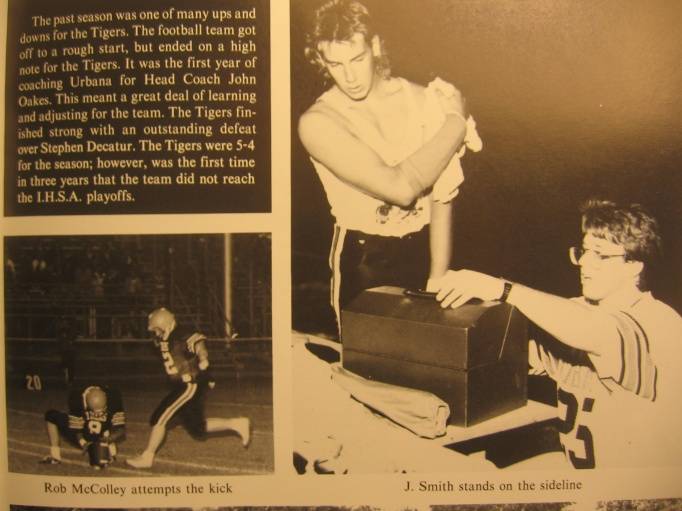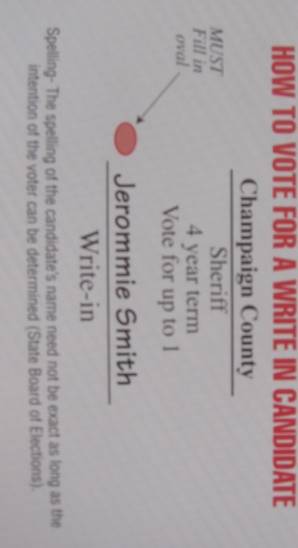 Jerommie Smith spent a decade at the Champaign County Sheriff’s Department, serving on the SWAT team. If he’s elected to head the office, his duties won’t be so exciting. Instead of hostage crises, he’s focused on solvency.
Jerommie Smith spent a decade at the Champaign County Sheriff’s Department, serving on the SWAT team. If he’s elected to head the office, his duties won’t be so exciting. Instead of hostage crises, he’s focused on solvency.
For one thing, he wants to change the way summonses are served — to reduce man hours, mileage and gas costs.
Jerommie says the current scheme sees process servers drive into and out of Urbana every day, which means an hour’s worth of driving at the least. Then add the gas you’re buying, wear and tear on vehicles…
His candidacy is no joke, but it does face one formidable obstacle: Jerommie Smith is not on the ballot.
There’s only one issue in this race. Sheriff Dan Walsh and/or sinister Republican Party operatives took away your chance to vote for anyone except Dan Walsh.

The Walsh camp successfully quashed its only opponent’s ballot petitions. Seems like a smart move, right?
Well, it turns out that voters prefer to choose, rather than having the choice made for them. If it weren’t for that stupid shenanigan, Walsh would probably coast to a third term.
HOW THEY SCREW YOU
It’s easy to keep an independent candidate off the ballot. The law in Illinois is written by party incumbents for the benefit of party incumbents. They challenge legitimate signatures from legitimate voters for all kinds of reasons, and they get away with it.
In the News-Gazette, Tom Kacich wrote “a Walsh ally challenged the petitions, more than 500 were found invalid and Smith’s name was removed from the ballot.”
That’s shameful reporting. It casts an aspersion of impropriety at worst, and incompetence at best.
In truth, Illinois law makes it easy for Republicans and Democrats to squeeze out challengers. Independent candidates must collect an indeterminate number of signatures from registered voters — Democrats, Republicans, Greens, National Socialists or non-partisans — affiliation is irrelevant.
The indeterminacy is governed by two rules. The number must be greater than 5% of the total ballots cast for that office in the previous election. The number may not be higher than 8% of those total ballots.
The 5% floor is 500% higher than requirements for established parties. The 8% ceiling means parties know exactly how many stricken signatures will kill a candidacy.
WHERE THEY SCREW YOU
If you’ve moved, your signature will be challenged. If you have the same name as someone else in the county, your signature will be challenged. But even if it’s you, at the right address, your signature may be challenged and stricken.
A party operative will argue that your scribbling — probably with a well-worn pen held gingerly while clasping a clipboard to your knee, bending over on your front stoop on a freezing night in January 2010 — doesn’t match the card you signed in an office decades ago. He’s probably right, and it doesn’t matter that it’s truly you.
The parties lie to voters about voting rights. They tell voters that signing petitions will restrict their right to vote. (You can’t sign a Republican petition and vote in the Democratic primary in that same election cycle. People do, of course.)
THE SHORT WINDOW
There’s a brief window of time when it’s legal to collect those signatures. But first, you have to find the people.
The parties have a list of voters, names and addresses. The independent candidate has to buy one. When Jerommie Smith bought his file of voter rolls from Champaign County Clerk Mark Shelden, the Excel file came without a schema.
Itwasonelonglineof
namesaddressesdatesofbirthpartyaffiliationsrecordsofballotscastinelectionsoverafifteenyearperiodetc.
This went on for the equivalent of hundreds of pages, rendering it useless. For Jerommie Smith, a precious day and a half of petitioning time was lost while he fought to get the proper files.
That’s one of the problems with The System. The political establishment relies on our ignorance.
ILLINOIS: BAD
There’s a reason most Illinois governors wind up in prison. Our politics is filthy, by law. If it weren’t for the judicial branch, it would be even worse.
I asked the nation’s foremost expert on ballot access laws to sum it up. See Richard Winger, below.
I also asked for opinions on Dan Walsh from fellow elected officials. Finally, I asked Mark Shelden for an interpretation of laws on ballot petition challenges.
All that’s below as well.

Jerommie and I were teammates. We didn’t have many classes together. He was never a close friend, but certainly not my enemy.
We see one thing alike: some jobs should not be political. That, he told me, is the reason he’s running as an independent. He and I both vote for candidates from various parties and no party.
HE SPELLS IT FUNNY
Jereme Richmond says it’s okay to be unique. But don’t worry about the spelling. If you can remember “Smith,” that’s all you need to know when you get in the voting booth.
Jerommie Smith will earn the votes of Independents simply because we hate ballot shenanigans. Democrats will vote for the candidate who is not the Republican. Green Party people aren’t about to vote Establishment.
The endorsements below may persuade voters. But they might hurt. If the Tea Party taught us anything, it’s that once-loyal Republican voters have had enough. They judge their party leaders just as bad as Democrats. Party-backed Republican candidates are run out of office, by witchcraft if necessary.
Still, any write-in campaign is a pipe dream against a one-party candidate in a one-party county, right?
I was surprised to find out: No.
Jerommie’s yard signs vastly outnumber the Walsh advertising. He’s taken in thousands of dollars in contributions. He’s lawyering-up for an election night he fully expects to be a fight.
He won’t be surprised to win.
Nominations of independent candidates for public office within any district or political subdivision less than the State, may be made by nomination papers signed in the aggregate for each candidate by qualified voters of such district, or political subdivision, equaling not less than 5%, nor more than 8% (or 50 more than the minimum, whichever is greater) of the number of persons, who voted at the next preceding regular election in such district or political subdivision in which such district or political subdivision voted as a unit for the election of officers to serve its respective territorial area.
…
Each voter signing a nomination paper shall add to his signature his place of residence, and each voter may subscribe to one nomination for such office to be filled, and no more: Provided that the name of any candidate whose name may appear in any other place upon the ballot shall not be so added by petition for the same office.
RICHARD WINGER ON ILLINOIS BALLOT ACCESS LAW
Illinois does have the 3rd most stringent petition requirement for independent candidates for US House. There is a huge disparity in Illinois between statewide office ballot access and US House.
The only worse petitions are Georgia (5% of the number of registered voters) and North Carolina (4% of the number of registered voters). Illinois is 5% of the last vote cast.
Illinois is also one of the “bad” eleven states in which it is impossible for a group to transform itself into a qualified party in advance of a particular election.
And, Illinois has the nation’s 2nd worst petition deadline for independent presidential candidates. The only one that is earlier is Texas.
There are so many variables to minor party and independent candidate ballot access, I never make a statement that such-and-such a state is the worst. I always narrow it down. Oklahoma is worst for president. Georgia is worst for U.S. House. Alabama is worst for statewide non-presidential. etc. Also one can separate out minor party from independent.
ON STRIKING PETITION SIGNATURES
Champaign County Clerk Mark Shelden:
The process for determining the validity of signatures is up to the particular electoral board hearing the challenge to a candidate’s nomination papers. There are a number of ways it can be done.
The State Board of Elections, for example, appoints a hearing officer for a case like this who would then set guidelines for reviewing signatures. Generally, State Board of Elections staff members maintain a list and make a determination as to the validity of the signature in the presence of observers from both the candidate and the objector.
In Champaign County, the Champaign County Officers Electoral Board handled the Smith matter in a similar way. They tasked the County Clerk’s staff with the responsibility of reviewing each challenged signature and making a determination as to its validity. Observers from both candidate and objector were present. A spreadsheet was kept noting whether either objector or candidate disagreed with the determination of the County Clerk staff person.
In the past, the Electoral Board has received copies of registration records for voters that matched the signatures on the petitions. In other instances, they have received registration records for voters where there was a “close call”.
I recall one instance, for example, where a voter’s signature had changed from one that looked fairly complete, to one that had just a single distinctive initial letter that clearly matched the signature on the voter registration record. That signature was allowed.
In one instance, the Electoral Board delegated the process to me individually and I reviewed signatures and registration records with two attorneys, with the idea that I would report back to the board. That objection was withdrawn as it became apparent that it was not going to be successful.
In another case, we had a person submit a sworn statement from a voter with their signature which had changed dramatically over the years. That signature was allowed.
In the Smith case, no signatures were actually officially invalidated. Instead, Smith withdrew his candidacy when it became apparent to him that the objections to his signatures were going to be sustained.
I believe that the Champaign County Electoral Board has a fairly liberal policy regarding signatures. As long as it is fairly clear that it is indeed the voter, it will be accepted. But the members of the Board can change and their view on how to handle these matters could as well.
INCUMBENTS FOR WALSH
RM:
I’m going to write an op-ed. It’s going to promote Jerommie, without regard to Sheriff Walsh’s competence. (I just don’t like ballot access trickery.)
But I invite you to offer anecdotal comment on Sheriff Walsh, on or off the record.
Champaign County State’s Attorney Julia Rietz:
“I support Dan. We have worked together very well on criminal justice issues in the county. His background as a lawyer and as a patrol officer has given him invaluable experience which he brings to his position as Sheriff. He works with the other members of the county criminal justice system, judges, public defender, my office, to control our jail population and provide appropriate services to our inmates, particularly mental health services. He has led the way on increasing mental health services in our jail in response to the jail suicides early in his tenure as sheriff. He has done a fine job staying within his budget and making the required budget cuts this past year, even though it has been very difficult for him given the 24/7 nature of his department. As far as “ballot access trickery,” I am troubled by the concept of a candidate for sheriff who is upset that he had to follow the law when it came to getting on the ballot. If Jerommie, who I know and who my husband has considered a friend for many years, did not want to have to obtain as many legitimate signatures of correctly registered voters as required to run county-wide as an independent he could have run in the Republican primary against Dan, because he is a Republican. Or, he could have run as a Democrat, which would be disingenuous because he is not a Democrat. So, he chose to run as an independent, which meant he had to get a very large number of signatures. That is the way the law is written. I am not suggesting that requirement is right or wrong, but it simply is the requirement. It is the law, and if a person wants to be Sheriff, the chief law enforcement officer in the county, then that person should respect the requirements of the law and not be upset when someone else holds him to it.”
Tim Johnson, your congressman:
“I’ve known Dan Walsh personally and professionally for decades. I have the utmost respect for his intelligence, work ethic and character. Champaign County is fortunate to have a sheriff of this caliber.”









